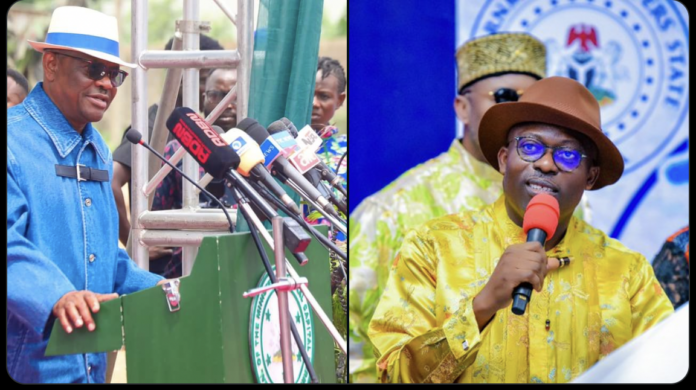The political crisis in Rivers State has taken center stage as the battle for control intensifies between Governor Siminalayi Fubara and former governor Nyesom Wike.
Chief Tony Okocha, the chairman of the All Progressives Congress (APC) Caretaker Committee in Rivers, has shed light on the ongoing crisis.
Okocha blames the escalating tensions on the struggle for political dominance within the state.
He attributes the crisis to the fallout between Governor Fubara and members of the state House of Assembly.
According to him, the unhealthy relationship between the governor and the lawmakers is a significant factor in the current turmoil.
Speaking to the News Agency of Nigeria (NAN) in Abuja, Okocha described the crisis as centrifugal, a battle that has centered around political control.
He emphasized that the internal conflict, which has long been brewing, has now come to a head under Governor Fubara’s leadership.
Okocha explained that the state’s troubles began during the tenure of Wike, who had transformed Rivers into a construction hub.
He recalled how Wike, now the Federal Capital Territory (FCT) Minister, worked tirelessly to build bridges and other vital infrastructure across the state.
“Wike was praised across the state and even beyond for his achievements,” Okocha noted.
But the problems began when Wike introduced Fubara, a political newcomer, into the political arena.
Okocha revealed that Fubara had spent most of his life as a civil servant.
“Fubara was never in politics,” Okocha explained. “He was a civil servant all his life.”
According to him, Wike had handpicked Fubara for the role of governor.
Fubara’s rise through the ranks was rapid, from director of finance and administration to Chief of Staff, and later to permanent secretary.
Eventually, Wike appointed Fubara as the Accountant-General of the state.
Okocha added that Fubara’s entry into politics was driven solely by Wike’s influence.
“Wike wanted to hand over to someone he could trust, as is common in Nigerian politics,” Okocha said.
But this decision has since backfired, as Fubara, now governor, has turned against Wike.
Okocha explained that Wike had gone out of his way to sell Fubara’s candidacy to the people of Rivers.
He spoke for him throughout the campaign, helping Fubara secure the governor’s seat.
However, Okocha pointed out that Fubara had never held any political office before becoming governor.
“He was never a councillor or local government chairman,” Okocha said. “His first position in politics is now the highest office in the state.”
The APC chairman claims that Fubara’s initial loyalty to Wike was a ruse.
“Fubara feigned loyalty and humility to Wike during the campaign,” Okocha stated.
This deception, Okocha believes, was part of a plan to get what he wanted from Wike.
Within three months of assuming office, Fubara allegedly began building his own political structures.
Okocha said that Fubara was influenced by politicians who opposed Wike and urged him to establish his own power base.
This marked the beginning of the political crisis.
According to Okocha, Fubara’s efforts to build his own structure have come at the expense of Wike’s well-established political network.
The governor’s actions have destabilized Wike’s political legacy in the state, leading to the current conflict.
Okocha explained that the battle between Fubara and Wike is, at its core, a fight over political structures.
He stressed that every politician needs a strong political structure to succeed.
“Wike cannot stand by and watch his political structure, which produced Fubara and many members of the state assembly, be dismantled,” Okocha stated.
The result has been a power struggle between the former governor and the current one.
“Fubara has become a stumbling block for Wike’s political ambitions,” Okocha continued. “And Wike is fighting back.”
The APC chairman noted that while Wike’s name is often linked to the political crisis, the real issue lies between Governor Fubara and the state lawmakers.
The struggle for control has left Rivers State in political disarray.
Okocha believes that the governor is “fighting himself,” creating chaos that is unnecessary.
He referenced a recent Federal High Court decision that dismissed a suit to replace 27 lawmakers who are loyal to Wike.
Okocha criticized Governor Fubara for his disregard for the law.
“Fubara is the chief law officer of the state, yet he also breaks the law,” Okocha said.
He accused the governor of selectively choosing which court orders to obey.
“When you pick and choose which laws to follow, you invite anarchy,” Okocha warned.
He compared Fubara’s actions to bringing “ant-infested firewood into his own house,” inviting trouble and chaos.

